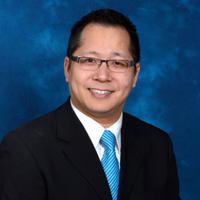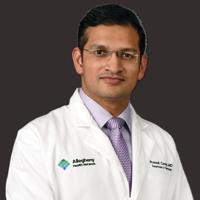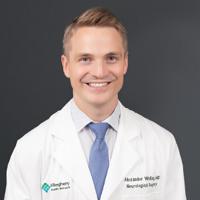AHN Neurosurgery CAST
Approved Fellowships
Complex Spine Fellowship
Fellowship Director: Alexander Yu, MD

Fellowship Director
Given the quantity and complexity of spine care and research opportunities, Allegheny Health Network is proud to provide advanced training for neurosurgeons and neurosurgery residents interested in spine. The program allows for a unique exposure to the broad spectrum of the treatment of spinal disorders, the pursuit of advancement through research, and the opportunity to teach residents and medical students. Teaching occurs in the operating room, didactic sessions, the department’s spine biomechanics laboratory and cadaveric work in our state of the art surgical arts center. Learning and teaching opportunities also arise during the department’s annual Spine Summit, a meeting involving the department and national leaders in spine care.
AHN’s spine surgery team is comprised of 4 orthopedic spine surgeons and 17 neurosurgeons. Allegheny General Hospital and Forbes Regional Hospital serve as referral centers for general and complex spine services. The spine program's approach is multidisciplinary, involving neurosurgeons, orthopedic surgeons, pain medicine and rehabilitation medicine. Research initiatives involve internal and external collaborations resulting in a multitude of available research endeavors. The Department of Neurosurgery’s spine biomechanics laboratory serves external and internal projects.
Endovascular Fellowship

Fellowship Director
Allegheny Health Network’s Neuroscience Institute is proud to provide advanced training in neuro-endovascular surgery via a 1- or 2-year CAST-certified fellowship program. Given the high level and quality of neuro-endovascular care available within the Allegheny Health Network, the program offers a unique exposure to the field of endovascular neurosurgery, advancement through research, and the opportunity to train as a future educator of residents, medical students, and neuro-endovascular surgeons.
Allegheny General Hospital serves as the flagship hospital within the Allegheny Health Network and is the main cerebrovascular center as well as comprehensive stroke center. The neuro-endovascular fellowship program is multidisciplinary in approach: fellows are trained by a core faculty from Departments of Neurological Surgery, Neurology, and Radiology. The fellowship will provide training in the full spectrum of neuro-endovascular procedures including aneurysm treatment, AVM embolization, AV fistula embolization, mechanical thrombectomy, MMA embolization, carotid angioplasty and stenting, head and neck embolization, cerebral venogram and venous sinus stenting, and spinal angiography and embolization.
Neurosurgical Oncology Fellowship

Fellowship Director
The Allegheny Health Network is comprised of eight hospital facilities and clinics primarily serving western Pennsylvania, West Virginia, Ohio and New York. Allegheny General Hospital serves as the main provider hub for the neurosurgical oncology program serving not only Allegheny Health Network, but also external facilities and clinics. The neuro-oncology program approach is multidisciplinary, involving neurosurgeons, neuro-oncologists, medical oncologists, radiologists, radiation oncologists and neuropathologists. Research initiatives involve internal and external collaborations resulting in a multitude of available research endeavors. Treatment and diagnostic modalities include surgical treatment (resection, biopsy, awake craniotomy, laser interstitial treatment), medical treatment (standard and clinical trial directed chemotherapy and immunotherapy), gamma knife, stereotactic radiosurgery, and advanced imaging (perfusion, spectroscopy, functional MRI).
Given the high level and quantity of neuro-oncology care and research opportunities, the Allegheny Health Network Department of Neurosurgery is proud to provide advanced training for neurosurgeons and neurosurgery residents interested in neuro-oncology. The program allows for a unique exposure to clinical neuro-oncology, the pursuit of advancement through research, and the opportunity to train as a future educator of neurosurgery residents, neuro-oncologists and medical students. Teaching occurs in the operating room, didactic sessions, and cadaveric work in our state of the art Center for Surgical Arts.
Stereotactic and Functional Neurosurgery Fellowship
Program

The Department of Neurosurgery at Allegheny General Hospital (AGH), part of the Allegheny Health Network (AHN), offers a one-year CAST-accredited fellowship in Stereotactic and Functional Neurosurgery for senior residents or post-graduate neurosurgeons seeking advanced training. Clinical activity is based primarily at AGH with additional operative exposure at select AHN community hospitals.
The fellowship is built within one of the largest functional neurosurgery practices in the United States by case volume. The core team includes five full-time functional neurosurgeons, complemented by additional faculty who contribute specialized expertise to select procedures, broadening operative exposure and mentorship.
Fellows participate in very high-volume operative experience, including:
- Stereo-electroencephalography (SEEG): several implantations each month with exposure to complex and cutting-edge implantation strategies and advanced inpatient monitoring paradigms. Fellows gain experience in challenging target selection, robotic techniques, and patient-specific network mapping.
- Resective epilepsy surgery: individualized resections with the ability to perform awake surgery and cortical and subcortical mapping when appropriate to maximize functional preservation.
- Neuromodulation for epilepsy and psychiatric disorders: responsive neurostimulation (RNS), vagus nerve stimulation (VNS), and emerging network-targeted stimulation strategies. Our program was among the first in the region to perform VNS for post-stroke hemiparesis and continues to explore novel indications and clinical applications for vagus nerve stimulation.
- Deep brain stimulation (DBS): extensive experience across movement and psychiatric disorders, including investigational and network-targeted approaches.
- Pain surgery: comprehensive exposure to ablative and neuromodulation procedures, microvascular decompressions (MVDs), revision pain operations, intrathecal therapies, and novel stimulation techniques.
Training is individually structured. At the start of the fellowship, the fellow and program director work together to design a curriculum tailored to the fellow’s career goals and academic interests. For some, this may mean a primary focus on epilepsy surgery and invasive monitoring; for others, it may emphasize advanced neuromodulation, movement and psychiatric indications, or complex pain procedures. The flexibility of the program allows each fellow to build deep operative expertise while also pursuing complementary skills in research, technology development, and academic productivity.
The program also provides strong academic and research infrastructure. Fellows have access to a fully staffed intracranial EEG laboratory and active SEEG-based studies defining risk–reward circuitry and patient-specific neuromodulation targets. The Allegheny Neuro-Technology Innovation Center (ANTIC) offers resources and mentorship for those pursuing device development and technology translation. Protected time and support for national meeting attendance and scholarly publication are part of the fellowship.
Graduates finish with a depth and breadth of operative experience matched by few programs nationally, along with the academic foundation to build and lead high-volume functional and epilepsy practices.
AHN Neurosurgical Administration
Kathleen Wendt
Administrative Coordinator
Kathleen.Wendt@ahn.org

